武则天 翻译
臣轨诚信章翻译

武则天《臣轨》原文夫修身正行,不可以不慎。
谋虑机权,不可以不密。
忧患生于所忽,祸害兴于细微。
人不慎密者,多有终身之悔。
故言易泄者,召祸之媒也。
事不慎者,取败之道也。
明者视于无形,聪者听于无声,谋者谋于未成。
不困在于早虑,不穷在于早豫。
非所言勿言,以避其患;非所为勿为,以避其危。
武则天《臣轨》注释、正行:端正品行。
2、忽:轻视。
3、慎密:谨慎周密,慎重隐密。
4、聪者:听觉灵敏的人。
5、豫:预计。
武则天《臣轨》翻译修身养性,端正品行,不能不慎重;谋划思考机密大事,不能不周密。
忧患常源于轻视小事,灾祸常因为忽略细节。
一个人行事不慎重周密,大多会后悔终生。
所以说,说话容易泄漏机密,是灾祸的媒介;做事不慎重,是失败的缘由。
眼睛明亮的人能看到无形的事物;耳朵聪敏的人能听到弦外之音;善于谋划的人对策出现在预兆之前;做事慎重的人在事情没发生之前就十分慎重。
远离困窘就必须及早谋划,不想贫穷就必须趁早预计。
不该说的话不说,可以避免祸患;不该做的做不做,可以躲避危险。
武则天《臣轨》赏析《臣轨》是中国古代女皇帝武则天的作品,唐上元二年(675)三月,女皇武则天引文学之士著作郎元万顷、左史刘?之等人,修撰此书,作为臣僚借鉴之书。
《臣轨》系唐代女皇武则天撰。
她原为唐太宗的才人,后来成为唐高宗的皇后。
她乘唐高宗体弱多病之机,参预朝政,并逐步专权。
高宗去世后,她继续把持朝政,先后废除了两个儿子的皇位。
在公元690年她67岁时,终于以武代李称帝,改国号为“周”,成为中国历史上唯一的女皇帝,并造了一个“?”(音照)字作为自己的名字。
武则天 Wǔ Zétiān (624-705 AD)—中国历史人物英文介绍
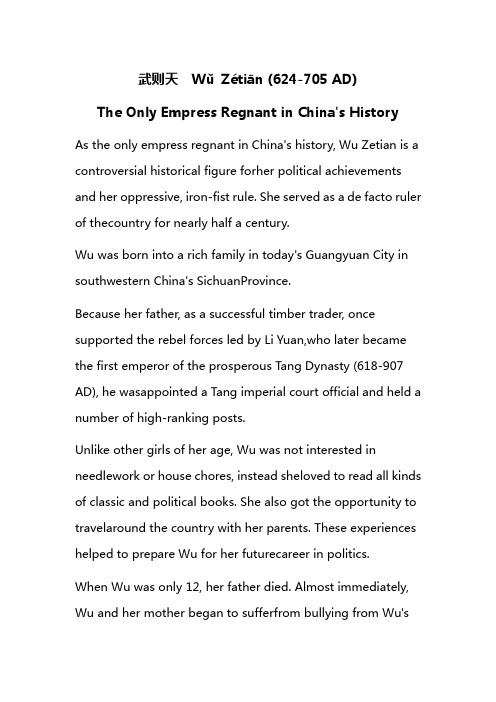
武则天WǔZétiān (624-705 AD) The Only Empress Regnant in China's History As the only empress regnant in China's history, Wu Zetian is a controversial historical figure forher political achievements and her oppressive, iron-fist rule. She served as a de facto ruler of thecountry for nearly half a century.Wu was born into a rich family in today's Guangyuan City in southwestern China's SichuanProvince.Because her father, as a successful timber trader, once supported the rebel forces led by Li Yuan,who later became the first emperor of the prosperous Tang Dynasty (618-907 AD), he wasappointed a Tang imperial court official and held a number of high-ranking posts.Unlike other girls of her age, Wu was not interested in needlework or house chores, instead sheloved to read all kinds of classic and political books. She also got the opportunity to travelaround the country with her parents. These experiences helped to prepare Wu for her futurecareer in politics.When Wu was only 12, her father died. Almost immediately, Wu and her mother began to sufferfrom bullying from Wu'suncles and other relatives and their lives became miserable. But after learning that Wu was a peerless beauty, the then Emperor T aizong summoned her to the imperial court and named her one of his concubines. That year, Wu was 13.Wu was a very bright, but extremely strong-willed person. She was also known for hercombination of sagaciousness and cunning.As a result, she never had any official titles conferred upon her by Emperor Taizong, despiteserving him for 12 years. The emperor believed that Wu was an extraordinary and ambitiouswoman, so he was always wary of her and tried hard to restrain her status and influence in theimperial court.One day, the emperor consulted an imperial astronomer about a widely spread rumor that afterthe third emperor of Tang an empress would take over the throne.The emperor asked if he should kill all the females at court he was suspicious of. The astronomersaid: "If it happens, it's Heaven's decree, man shouldn't interfere."Not long after Emperor Taizong died in 649 AD, Wu became the empress of his son, the newEmperor Gaozong.In the following years, Empress Wu began to gain more and more influence in the imperial court and she was actually making many important decisions in state affairs in the later years ofEmperor Gaozong.After Emperor Gaozong died, Wu became the Empress Dowager and she first deposed the nextnew emperor and then installed her youngest son as a puppet emperor. She herself began topreside over all important imperial court gatherings.Wu, as the de facto ruler, resorted to ruthless and oppressive means to consolidate her power.She killed almost all her opponents and recruited the cruelest officials in the country to helpmaintain social order.However, despite her bad reputation as a ruler, Wu also knew how to use talented people to helpher rule the country.She followed the advice of her aides to reduce corvee and taxes and promote agriculture and theeconomy. As a result, the country flourished under her reign and the population nearly doubled.According to the traditional Chinese order of succession, a woman could never ascend thethrone. In order to achieve her ambition of becoming the first empress regnant of the country,Wu founded her own dynasty in 690 AD. Wu's dynasty, called Zhou, lasted for 15 years until 705AD, the year Wu fell sick and died.Wu was not only a great politician, but also a renowned poet. She was also frequently cited inpoems written by great ancient Chinese poets.In modern times, Wu's stories have been adapted into numerous novels, stage plays andtelevision dramas.。
武则天骂人文言文翻译

原文(文言文):武则天,天生丽质,才貌双全。
然性好猜忌,心机深沉。
一日,朝中大臣张易之因事得罪,武则天怒不可遏,遂于朝堂之上,以雷霆之怒,痛斥张易之。
其言辞锋利,如刀剑般犀利,令人闻之胆寒。
以下是武则天骂张易之的原文及其翻译。
原文:“尔何人斯,敢犯吾威?无才无德,妄自尊大。
尔之所作所为,皆逆天悖理。
今日尔既得罪于朕,当知罪己,速速退下,以谢朕之怒。
否则,尔之性命,休想保全!”翻译:“汝何人也,敢触吾之威严?无才无德,却妄自尊大。
汝之行径,皆悖逆天理。
今日汝既得罪于朕,当知反省,速速退去,以谢朕之怒。
若不然,汝之性命,岂能保全!”原文:“尔自比于贤,岂不知己之短?尔之所为,皆不足以服人。
尔之才学,不足以治国;尔之品德,不足以立身。
今日尔若不思悔改,必遭天谴!”翻译:“汝自比于贤者,岂不知己之短处?汝之行径,皆不足以使人心服。
汝之才学,不足以治理国家;汝之品德,不足以立身于世。
今日汝若不思悔改,必将遭受天罚!”原文:“尔之罪状,如山积,如海深。
尔若不思改过,必遭国法之惩。
朕今赐尔三思,若再犯,决不轻恕!”翻译:“汝之罪行,堆积如山,深不可测。
汝若不思悔改,必将受到国家法律的严惩。
朕今赐汝三次思考的机会,若再犯,决不轻饶!”原文:“尔等皆视朕如无物,敢犯吾国法。
今尔犯事,当知罪己,速速退下。
否则,尔等之性命,皆为朕之怒火所吞噬!”翻译:“尔等皆将朕视为无物,敢触犯我国法。
今汝犯事,当知反省,速速退去。
若不然,尔等之性命,必将为朕之怒火所吞噬!”武则天之骂,如雷霆万钧,令张易之等人胆战心惊。
此骂文虽短,却彰显了武则天之威严与权势,亦可见其性格之果断与狠辣。
翻译成现代汉语,更能让人深刻体会其气势与怒火。
武则天简介-中英文对照

今天我要介绍的是中国历史上空前绝后的唯一一位女皇帝—武则天,她创造了中国历史的奇迹。
Today I want to introduce the only female emperor in China’s history ---- Wu Zetian,who created the miracle of Chinese history。
她是中国历史上杰出的政治家、军事家,同时也是一位诗人。
She was an outstanding politician,strategist as well as a poet in Chinese history.武则天出生于唐朝大户人家,她拥有盖世的美丽,绝顶的聪明,并喜欢读书。
she was born in a wealthy family in Tang dynasty,She had thematchlessly beautiful and the very intelligent, and she also liked reading.童年时曾随父母游历了名山大川,培养了她的眼界和才干,所有的这些为以后称帝奠定了基础。
she had visited famous mountains and great rivers with her parents when she was a child, which had broadened her horizon and developed her talents, and all of these had laid the foundation for becoming the empress in the future.•她14岁入宫,在经历了很多坎坷和磨难(例如感业寺出家)之后最终登上了皇位。
She was sent to the palace when she was fourteen, after many difficulties and hardships(such as become a nun in Ganye temple ),she became the empress in the finally. 公元690年,武则天改国号唐为周,正式做了皇帝。
武则天英文简介

Empress Wu ZetianWu Zetian was born of a royal lineage during the Tang Dynasty. She entered Emperor Taizong's harem when she was 13 and that of the successive emperor Gaozong after. A master of manipulation, Wu Zetian persuaded the emperor to declare her one rank below the empress consort. Eventually, the Emperor married Wu. When Gaozong suffered a stroke five years later, Wu governed behind the scenes. She created a secret police force to spy on her opposition, jailing or killing those who stood in her way.After Gaozong's death she reigned through puppet emperors, her sons Zhongzong and Ruizong. She finally proclaimed herself Emperor, the first woman to do so. Wu ruled until her 80s when she was unable to thwart a coup. She died shortly after. Despite her ruthless climb to power, her rule was benign. Wu reduced the size of the standing army, and replaced aristocrats in the government with scholars. She was fair to the peasantry, lowering taxes, raising agricultural production, and strengthening public works. Wu also campaigned to elevate the status of women and had scholars write biographies of famous women.今天我要介绍的是中国历史上空前绝后的唯一一位女皇帝—武则天,她创造了中国历史的奇迹。
武则天荐贤文言文翻译

武则天,天授元年,始议置宰相。
初,武后欲自用事,故置武三思为内史,以参政事。
三思不才,政事多废。
武则天知其不称职,欲易之。
会武后兄子武承嗣荐郭元振于武则天,元振有才干,武则天悦之,遂以元振为宰相。
时郭元振为左补阙,以直言敢谏,甚得人望。
武则天闻其名,召见之,问以国事。
元振对曰:“陛下若欲致治,必先去谗言,亲贤臣,远小人,此乃致治之要也。
”武则天深然其言,遂罢免武三思,以元振代之。
元振为相,励精图治,政事修举。
时郭元振弟郭元亨亦以文学知名,武后闻而召见之,欲以为秘书少监。
元亨辞曰:“臣兄弟二人,皆以文学得幸,恐非陛下之意。
臣愿以弟元振为之,元亨愿退居草野,以俟陛下之求。
”武则天嘉其让德,遂从其请,以元振为相,元亨为少监。
元振为相,举贤授能,政事日新。
时天下承平日久,百姓丰足,元振乃建议,开疆拓土,广求异才,以备不时之需。
武则天从之,遂命元振领兵征讨四夷,以扩我国土。
元振领兵,勇猛果断,屡战屡胜,威震四海。
归朝后,武则天赐以金帛,封为凉州都督。
元振不贪功名,以国家为重,辞谢不受。
武则天益加敬重,乃以元振为中书令,掌管机要。
元振在中书令任上,竭尽忠诚,为国谋利。
时武三思之子武崇训,为人贪婪,颇得武后宠信。
元振上疏,极言其恶,武后不得已,乃罢免武崇训。
元振又荐举贤良,以充实朝堂,使得天下大治。
然元振亦知武后晚年多疑,政事多有不善。
乃上疏曰:“陛下宜以国家为重,不宜以私情害公。
臣愿陛下明察秋毫,去邪存正,以保国家之安宁。
”武则天览疏,深感悟,遂罢免武三思之子武崇训,以示正道。
郭元振之贤,深得武则天赏识。
然武则天晚年,武三思等旧臣,复有窥伺之志。
元振知其情,乃上疏曰:“陛下宜早定储君,以绝后患。
臣以为,武三思等旧臣,非陛下之良辅,宜渐退之。
”武则天览疏,深以为然,遂命元振辅佐新君,以安社稷。
郭元振辅佐新君,尽心竭力,使得国家得以安宁。
武则天崩,新君即位,封元振为太师,赐予金印,以示恩宠。
元振不负所望,继续辅佐新君,使得国家日益强盛。
武则天
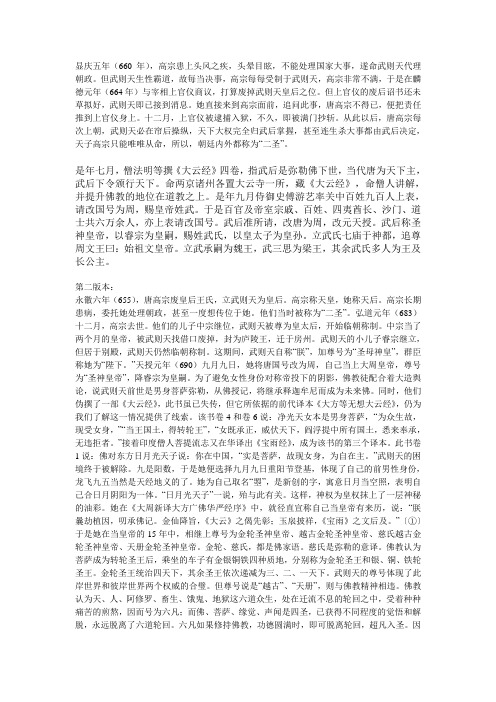
显庆五年(660年),高宗患上头风之疾,头晕目眩,不能处理国家大事,遂命武则天代理朝政。
但武则天生性霸道,故每当决事,高宗每每受制于武则天,高宗非常不满,于是在麟德元年(664年)与宰相上官仪商议,打算废掉武则天皇后之位。
但上官仪的废后诏书还未草拟好,武则天即已接到消息。
她直接来到高宗面前,追问此事,唐高宗不得已,便把责任推到上官仪身上。
十二月,上官仪被逮捕入狱,不久,即被满门抄斩。
从此以后,唐高宗每次上朝,武则天必在帘后操纵,天下大权完全归武后掌握,甚至连生杀大事都由武后决定,天子高宗只能唯唯从命,所以,朝廷内外都称为“二圣”。
是年七月,僧法明等撰《大云经》四卷,指武后是弥勒佛下世,当代唐为天下主,武后下令颁行天下。
命两京诸州各置大云寺一所,藏《大云经》,命僧人讲解,并提升佛教的地位在道教之上。
是年九月侍御史傅游艺率关中百姓九百人上表,请改国号为周,赐皇帝姓武。
于是百官及帝室宗戚、百姓、四夷酋长、沙门、道士共六万余人,亦上表请改国号。
武后准所请,改唐为周,改元天授。
武后称圣神皇帝,以睿宗为皇嗣,赐姓武氏,以皇太子为皇孙。
立武氏七庙于神都,追尊周文王曰:始祖文皇帝。
立武承嗣为魏王,武三思为梁王,其余武氏多人为王及长公主。
第二版本:永徽六年(655),唐高宗废皇后王氏,立武则天为皇后。
高宗称天皇,她称天后。
高宗长期患病,委托她处理朝政,甚至一度想传位于她。
他们当时被称为“二圣”。
弘道元年(683)十二月,高宗去世。
他们的儿子中宗继位,武则天被尊为皇太后,开始临朝称制。
中宗当了两个月的皇帝,被武则天找借口废掉,封为庐陵王,迁于房州。
武则天的小儿子睿宗继立,但居于别殿,武则天仍然临朝称制。
这期间,武则天自称“朕”,加尊号为“圣母神皇”,群臣称她为“陛下。
”天授元年(690)九月九日,她将唐国号改为周,自己当上大周皇帝,尊号为“圣神皇帝”,降睿宗为皇嗣。
为了避免女性身份对称帝投下的阴影,佛教徒配合着大造舆论,说武则天前世是男身菩萨弥勒,从佛授记,将继承释迦牟尼而成为未来佛。
武则天的英文介绍(Empress Wu Zetian in Dang Dynasty)

中华女皇帝武则天Empress Wu Zetian in Dang DynastyEmpress Wu was the only female monarch of China, and remains the mostremarkable, influential and mysterious woman in Chinese history.Contrary to the teachings of Confucius, this was a woman who ruled theempire for over half a century; while her actions have been a subject for debate formore ten centuries. Opinion is sharply divided between those who admire her for hermany achievements and those who regard her as a ruthless, merciless schemer andautocrat. Others will say merely that she did what she had to do and that her actions were no different from those of male emperors.AchievementsIn spite of her ruthless rise to power, Wu proved to be a very competent monarch and throughout her reign the legacy of prosperity bequeathed by the late Taizong.The Empress was eager to draw into her government all manner of talented people. In the first year of her period of absolute power, she sent officials far and wide to search for people of outstanding ability. Wu Zetian even encouraged people to volunteer their services should they consider themselves of value to her. In this way no effort was spared to recruit able persons into the civil service. The imperial examination system was further revised in order that no man of ability should be excluded due to his lowly birth. She also initiated the practice of personally interviewing candidates. These formalities guaranteed appointments could no longer be obtained through patronage, bribery or corruption.Surprisingly, she showed tolerance towards her critics. Ever willing to listen to new ideas and suggestions, she generously rewarded those who offered sound advice and demonstrated enterprise. This ensured that throughout her long reign, she always had the support of a loyal administration.Wu Zetian attached great importance to the development of agriculture. She ordered the construction of irrigation schemes. So as to create a bank of knowledge about agricultural matters and develop expertise, she commissioned the compilation of farming textbooks. Local officials were charged with the task of bringing more land under cultivation. As an incentive for increased production, taxes were reduced and the imposition upon the peasant population was eased. By allowing peasant farmers to retain more of their produce, they were able to improve their living standard and in general the population benefited from quite considerable prosperity.The relationships that had been established between the empire and the neighboring Tubo deteriorated. A series of many border skirmishes led to a final defeat of the Tubo in 692. Afterwards, steps were taken to keep the vast lands to the north and south of the Tainshan Mountains secure from invasion. The Anxi Military Viceroy and the Beiting Military Viceroy were given responsibility for the area, with the consequence that Wu’s defence policy effectively consolidated the north-western border region.Wu’s religious policy gave Buddhism precedence over Taoism as the favoured state rel igion. She encouraged gifted scholars to settle in China and many Buddhist temples were built. Also, many of the finest Buddhist cave sculptures were created. Under the patronage of the Empress, Buddhism made its greatest advances within China.Wu Zetian poured scorn on the Confucian belief that women should always be subordinate to men. As well as furthering her own ambitions, she sought to enhance the position of women in society. This included employing scholars to write biographies of famous women. These works served as a reminder to everyone that women were every bit as capable ofmen. All they lacked was equal opportunity.The DownsideIt is said there is good and bad in everybody. So far as Wu Zetian was concerned, when she was bad she could be very bad indeed. To achieve her ambitions she was as ruthless as possible. She did not hesitate to arrange the murders of members of her family, her husband’s concubines or ministers if they opposed her. Even Wu’s infant daughter was sacrificed in order that she might succeed in her desire for power. The men whose loyalty to both Li Yuan and Li Shimin had helped establish the Tang Dynasty were subjected to her cruelty. These included Zhangsun Wuji, Chu Suiliang, Yu Zhining and Cheng Wuting and many others who were either put to death or reduced in rank. Members of the Li royal family and their relatives were likewise eliminated.Once she was on the throne, Wu was ever cautious lest any of her ministers proved to be disloyal or plot against her. She appointed sadistic and cruel officials to seek out and eliminate any opposition to her regime. Men such as Suo Yuanli, Zhong Xing and Lai Juncheng became famous due to their methods of exposing so-called enemies of their mistress. In such times, it is possible to be rid of rivals by denouncing them as conspirators or laying trumped up charges against them. So, although those who opposed Wu were severely dealt with, also many other innocent people were cruelly put to death. However, once Wu Zetian was satisfied that her regime was secure, she did relax some of her repressive measures and there were far fewer executions.In her later life, and probably to ease her conscience, Wu Zetian resorted to Buddhism for solace. Her enthusiasm for building temples and monuments placed a huge strain on resources and labour. This show of religious fervour could not hide her continued craving for greatness and acclaim as she enjoyed an extravagant lifestyle. In particular, her penchant for her male concubines contributed to her reputation for decadence!Retirement from Center StageAs Wu grew older, so her hold on state affairs began to lessen. She also realised that as a woman, she could only be respected after her death as a member of the Li family. She therefore allowed herself to be persuaded in 698 to reinstate Li Xian as Crown Prince.Aged eighty-two, Wu Zetian died in the December of the year in which she had been deposed. She was buried alongside Emperor Gaozong in the Qingling Tomb, located west of the present day Xian City. At her own wish, her final resting place was marked by a plain tombstone lacking any inscription. To some, this symbolises her absolute power that no words could describe. To others the absence of any comment suggests that she wanted future generations to decide for themselves how she should be eulogized.So lived and died the only woman who ever ruled the Chinese empire in her own right. According to Confucius, having a female monarch is unnatural as ‘a hen crowing like a rooster at daybreak.’ However, for what proved to be one of the most glorious periods during the Tang Dynasty, a woman did rule the empire. What is more, she did so with more than fair measure of success. Down the ages, many have described Wu as a ruthless, cruel and despotic autocrat. Others, with rather more pragmatic views, have said she merely behaved as many men in her position had done, both before and since her notorious reign.。
武则天禁屠文言文的翻译

武后制,禁屠。
时人咸谓,自昔帝王,未有禁屠者。
武后独出己意,以为杀人多,故止之。
于是天下皆颂其德,而朝野相庆。
然禁屠之令,非一日之故,其源远矣。
昔者,帝喾之世,有兽名貔貅,能食虎豹,不犯人畜。
帝喾感其仁,遂封为貔貅将军,以镇四方。
自是之后,天下少有猛兽为害。
至周穆王,有兽名貔貅,亦能食虎豹,人皆以为祥瑞。
穆王封为貔貅侯,赐之土地,使之镇守。
自后,貔貅之名,遂为吉祥之兆。
及秦皇汉武,虽武功赫赫,然亦知仁政为本。
汉武时,有禁屠令,以其残忍,故禁之。
至唐太宗,虽以武功著称,亦深知仁政之要。
太宗曾曰:“杀人如草不救,非仁也。
”是以唐室历代,虽征战不已,然亦多行仁政。
武后继位,亦深知仁政之道。
观其一生,虽权谋之术高明,然亦深知民心向背。
故当天下多事,民不聊生之时,武后决意禁屠,以示仁德。
此令一出,天下百姓欢呼雀跃,皆以为武后仁心仁术,可比古人。
然禁屠非易事,须得有法可依。
武后于是下令,凡屠户之家,须立禁屠碑,刻其家规,以示后人。
又命官吏巡视,如有违令者,严惩不贷。
此举使得禁屠令得以实施,而屠户之家亦不敢再行屠戮。
时人感武后之德,遂有歌曰:“武后禁屠,仁心仁术。
天下归心,四海升平。
”此歌传遍天下,无人不颂其德。
而武后禁屠之举,亦为后世所传颂,成为千古佳话。
然禁屠之令,亦非全无弊端。
时有百姓,因禁屠而食不饱腹,遂有怨言。
武后闻之,知禁屠之令有失偏颇,遂下令放宽禁屠,允许百姓自养家畜。
此举使得民生得以改善,而禁屠之令亦得以延续。
总之,武后禁屠之举,虽有其弊端,然其仁政之道,却为后世所传颂。
武后之德,亦为后人所景仰。
是以,史册之中,武后禁屠之举,成为千古佳话,流传至今。
翻译:武则天颁布了禁止宰杀的命令。
当时的人们都认为,自古以来,没有一个帝王曾经禁止宰杀。
武则天却独出心裁,认为杀生过多,因此下令禁止。
于是,天下的人都赞誉她的德行,朝野上下共同庆祝。
然而,禁止宰杀的命令并非一日之功,它的源头非常久远。
在帝喾的时代,有一种名为貔貅的野兽,能够捕食虎豹,不会侵害人畜。
武则天登基诏书原文及译文

武则天登基诏书原文及译文武则天登基可是中国历史上的一件大事,那登基诏书更是很值得咱们好好聊聊。
咱先说这原文吧。
可惜啊,并没有完整保存下来那原汁原味的武则天登基诏书原文。
不过从一些历史资料的只言片语中,咱们也能大致感受到当时的气象。
这就好比啊,你要去看一场特别盛大的演出,结果只看到了一点点幕后花絮,但就这一点点也能让你想象出舞台上有多精彩。
虽然没有完整的诏书原文摆在眼前,可咱们能通过其他途径去揣摩。
就像你没吃到一整个大西瓜,但吃了几块也能知道西瓜有多甜。
再说这译文吧,就算没有确切的对应于那可能残缺的原文的译文,但咱们可以从武则天登基这件事本身去理解一些隐含的“译文”。
武则天登基打破了当时男尊女卑的传统格局,就像平静的湖面投进了一块大石头。
在那个时代,男人当皇帝是天经地义的事,就像太阳从东边升起一样自然。
可武则天呢,她偏要改变这个规则。
这就好比在一群白羊里突然出现了一只黑羊,而且这只黑羊还成为了领头羊。
她的登基告诉世人,女性也有能力治理天下,就像母鸡也能打鸣守护鸡窝一样(这个比喻可能有点怪,但就是这么个理儿)。
她在位期间推行了一系列的政策,这其实就像是一个新的厨师进了厨房,带来了全新的菜谱。
她改革科举制度,让更多有才能的人有机会施展抱负,这就好比给一群饥饿的人打开了粮仓的大门,大家都能来分一杯羹。
武则天的登基诏书不管是原文还是那我们需要去意会的“译文”,都有着深远的意义。
它就像一阵狂风,吹散了封建礼教下对女性的束缚。
以前的女性就像被关在笼子里的鸟,只能在狭小的空间里活动,而武则天的登基就像是打开了鸟笼的门,让女性看到了外面广阔的天空。
咱们再从老百姓的角度看。
对于普通百姓来说,皇帝是谁可能最初他们并不关心,就像一群羊不管是哪个牧羊人带领,它们最关心的是有没有草吃。
可是武则天在位期间,她做出的政策改变,让百姓的生活有了变化,就像干涸的土地迎来了一场甘霖。
她重视农业发展,让老百姓能填饱肚子,这就像给寒夜里的人送来了温暖的被子。
武在文言文翻译

夫武者,国之重器,民之保障也。
自古至今,凡有国家,必有武备。
武备者,所以安邦定国,御侮止暴也。
今欲论武在文言文之翻译,须先明其意,而后方能得其真谛。
武,古文作“武”,从止从戈,会意。
止,止息也;戈,兵器也。
止戈为武,意即以武力止息战争,以武安天下。
武,又有勇敢、刚毅之意。
在文言文中,武字多用于形容武士、武将、武德等。
以下列举几例武在文言文中的翻译:1. 武王伐纣,天下归心。
译:武王征伐纣王,天下百姓都归心武王。
2. 武林高手,出神入化。
译:武术高手,技艺高超,出神入化。
3. 武德高尚,威震四方。
译:武德高尚,威名远播,震动四方。
4. 武林大会,英雄聚会。
译:武林盛会,英雄豪杰齐聚一堂。
5. 武艺超群,无人能敌。
译:武艺高强,无人能够匹敌。
6. 武侯诸葛亮,鞠躬尽瘁,死而后已。
译:武侯诸葛亮,勤勤恳恳,竭尽全力,直至生命终结。
7. 武林秘籍,千古绝学。
译:武林秘籍,千古绝世之学。
8. 武则天,女中丈夫,治国安邦。
译:武则天,女中豪杰,治理国家,安定邦国。
9. 武松打虎,勇猛无比。
译:武松打死老虎,勇猛无比。
10. 武则天立无字碑,千古之谜。
译:武则天树立无字碑,成为千古之谜。
综上所述,武在文言文中的翻译,需结合上下文,理解其含义,才能准确表达。
武字在文言文中,不仅代表武力,还包含勇敢、刚毅、武德等多重含义。
在翻译时,应注重传达其内在精神,使读者领略到武之真谛。
武后时文言文翻译

武后陛下,姓武,名曌,字则天,并州文水人。
高祖李渊第五女,太宗李世民之妹,母为太穆皇后。
陛下幼而聪颖,好学不倦,博览群书,才识过人。
及长,封为才人,后升为昭仪,深得太宗宠爱。
太宗崩,太子李治即位,是为高宗。
高宗体弱多病,政事多由皇后武则天裁决。
陛下自登基以来,励精图治,任贤用能,政治清明,国力日盛。
陛下深知“安不忘危”,故常以严刑峻法整肃朝纲,以保国家长治久安。
时值唐高宗永徽四年,突厥犯边,陛下命李靖、苏定方等将领率军征讨,大破突厥,解除了边患。
又于永隆二年,平定李敬业、徐敬业之乱,巩固了皇权。
陛下不仅在内政上颇有建树,在外交上亦显赫一时。
与日本、朝鲜等邻国建立友好关系,互通有无,促进了中外交流。
陛下在位期间,提倡科举制度,选拔贤能,广纳贤才。
增设殿试,以选拔真才实学之士。
同时,陛下亦重视教育,增设学校,选拔优秀人才。
此举使得天下人才辈出,为我朝繁荣昌盛奠定了坚实基础。
武后陛下在位期间,大力发展经济,改革税制,减轻百姓负担。
又推行均田制,使土地得到合理分配,农民生活得到改善。
此外,陛下还重视水利建设,兴修水利,灌溉农田,提高农业产量。
使得我朝经济繁荣,国库充盈。
然而,武后陛下在位期间,亦有其争议之处。
如重用酷吏,严刑峻法,导致冤假错案频发。
然陛下亦深知“水能载舟,亦能覆舟”,故在晚年逐渐放宽政策,减轻刑罚,使得国家政治逐渐清明。
武后陛下在位十六年,享年八十二岁。
其在位期间,我朝政治稳定,国力强盛,被誉为“贞观之治”的延续。
陛下去世后,追尊为则天大圣皇帝,庙号则天。
综上所述,武后陛下临朝称制,威震四方,前无古人,后无来者。
其政治才能、治国理念以及对国家、民族的贡献,均为后世所称颂。
吾辈后人,当以武后陛下为榜样,奋发向前,为民族复兴、国家繁荣而努力拼搏。
武则天升仙太子碑原文及译文
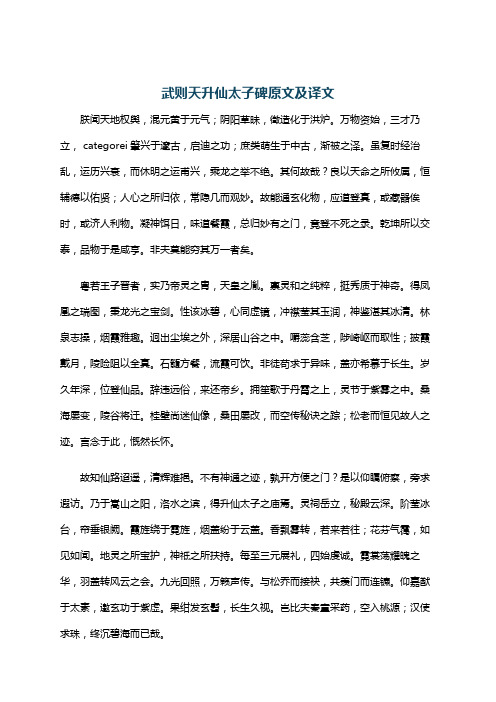
武则天升仙太子碑原文及译文朕闻天地权舆,混元黄于元气;阴阳草昧,徵造化于洪炉。
万物资始,三才乃立, categorei肇兴于邃古,启迪之功;庶类萌生于中古,渐被之泽。
虽复时经治乱,运历兴衰,而休明之运甫兴,乘龙之举不绝。
其何故哉?良以天命之所攸属,恒辅德以佑贤;人心之所归依,常隐几而观妙。
故能通玄化物,应道登真,或藏器俟时,或济人利物。
凝神饵日,味道餐霞,总归妙有之门,竟登不死之录。
乾坤所以交泰,品物于是咸亨。
非夫莫能穷其万一者矣。
粤若王子晋者,实乃帝灵之胄,天皇之胤。
禀灵和之纯粹,挺秀质于神奇。
得凤凰之瑞图,秉龙光之宝剑。
性该冰碧,心同虚镜,冲襟莹其玉润,神鉴湛其冰清。
林泉志操,烟霞雅趣。
迥出尘埃之外,深居山谷之中。
嚼蕊含芝,陟崎岖而取性;披霞戴月,陵险阻以全真。
石髓方餐,流霞可饮。
非徒苟求于异味,盖亦希慕于长生。
岁久年深,位登仙品。
辞违远俗,来还帝乡。
拥笙歌于丹霄之上,灵节于紫雾之中。
桑海屡变,陵谷将迁。
桂壁尚迷仙像,桑田屡改,而空传秘诀之踪;松老而恒见故人之迹。
言念于此,慨然长怀。
故知仙路迢遥,清辉难挹。
不有神通之迹,孰开方便之门?是以仰瞩俯察,旁求遐访。
乃于嵩山之阳,洛水之滨,得升仙太子之庙焉。
灵祠岳立,秘殿云深。
阶莹冰台,帘垂银阙。
霞旌绕于霓旌,烟盖纷于云盖。
香飘雾转,若来若往;花芬气霭,如见如闻。
地灵之所宝护,神祗之所扶持。
每至三元展礼,四始虔诚。
霓裳荡耀魄之华,羽盖转风云之会。
九光回照,万籁声传。
与松乔而接袂,共羡门而连镳。
仰嘉猷于太素,邀玄功于紫虚。
果绀发玄髫,长生久视。
岂比夫秦童采药,空入桃源;汉使求珠,终沉碧海而已哉。
方今绀宇初兴,真仪乍映。
披回雪之纨素,藻飞云之丹青。
地似从桥,门疑入洞。
灵仙可接,惟期轩驾之时;光景斯留,式表希夷之趣。
其铭曰:邈矣仙踪,奇哉灵异。
紫府金庭,青溪玉砌。
地接嵩岩,山连缑岭。
瑞气氤氲,祥烟窈冥。
王子登仙,腾云驭鹤。
千载之下,空余庙貌。
岩岩宝阁,肃肃金铺。
《则天实录》原文翻译

《则天实录》原文翻译
摘要:
一、武曌背景与地位
1.荆州江陵人
2.太宗才人、高宗昭仪、皇后
3.天后、二圣
二、武曌临朝称制
1.太子显即位,尊天后为皇太后
2.光宅元年,废皇帝为庐陵王
3.立豫王旦为皇帝,令天后临朝称制
三、改元与颁布《则天实录》
1.垂拱四年,改元永昌
2.次年,改元载初
3.颁布《则天实录》
四、《则天实录》内容与卷数
1.述武曌一生功业
2.十卷分为不同称号
正文:
武曌,荆州江陵人,起初为唐太宗的才人。
太宗去世后,按照嫔御的规定,她进入感业寺为尼。
高宗即位后,又把她召入宫中,封为昭仪。
永徽六年,她被立为皇后。
上元元年,她的称号加号为“天后”,与高宗并称“二
圣”。
弘道元年,高宗去世,太子显即位,尊天后为皇太后,临朝称制。
光宅元年,废黜皇帝为庐陵王,立豫王旦为皇帝,天后临朝称制,改年号为垂拱。
垂拱四年,武曌亲自祭祀明堂,大赦天下,改年号为永昌。
第二年,又改年号为载初,并颁布《则天实录》。
《则天实录》详细记录了武曌一生的功业,由天后亲自撰写。
实录共十卷,分别为:圣母神皇、圣神皇帝、圣神天帝、大圣天后、则天大圣皇后、则天大圣帝、则天大圣神皇、圣母神皇、圣神天帝和大圣天后。
关于武则天的古诗原文和翻译
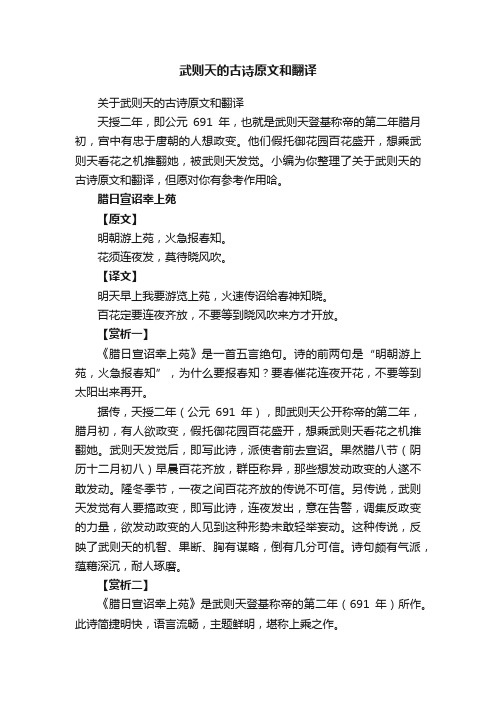
武则天的古诗原文和翻译关于武则天的古诗原文和翻译天授二年,即公元691年,也就是武则天登基称帝的第二年腊月初,宫中有忠于唐朝的人想政变。
他们假托御花园百花盛开,想乘武则天看花之机推翻她,被武则天发觉。
小编为你整理了关于武则天的古诗原文和翻译,但愿对你有参考作用哈。
腊日宣诏幸上苑【原文】明朝游上苑,火急报春知。
花须连夜发,莫待晓风吹。
【译文】明天早上我要游览上苑,火速传诏给春神知晓。
百花定要连夜齐放,不要等到晓风吹来方才开放。
【赏析一】《腊日宣诏幸上苑》是一首五言绝句。
诗的前两句是“明朝游上苑,火急报春知”,为什么要报春知?要春催花连夜开花,不要等到太阳出来再开。
据传,天授二年(公元691年),即武则天公开称帝的第二年,腊月初,有人欲政变,假托御花园百花盛开,想乘武则天看花之机推翻她。
武则天发觉后,即写此诗,派使者前去宣诏。
果然腊八节(阴历十二月初八)早晨百花齐放,群臣称异,那些想发动政变的人遂不敢发动。
隆冬季节,一夜之间百花齐放的传说不可信。
另传说,武则天发觉有人要搞政变,即写此诗,连夜发出,意在告警,调集反政变的力量,欲发动政变的人见到这种形势未敢轻举妄动。
这种传说,反映了武则天的机智、果断、胸有谋略,倒有几分可信。
诗句颇有气派,蕴藉深沉,耐人琢磨。
【赏析二】《腊日宣诏幸上苑》是武则天登基称帝的第二年(691年)所作。
此诗简捷明快,语言流畅,主题鲜明,堪称上乘之作。
与诗序整体来看,充分反映了女皇洞察一切的睿智,随机应变的能力,刚毅果断的作风以及号令一切、吞吐宇宙的.气概。
女皇初登大宝之位,需要树立权威,方能驾驭天下。
此诗正好显示了女皇主宰一切的神气和至高无上的尊严。
【赏析三】这首诗写腊八节百花盛开的奇景,也是一首具有特殊价值的诗歌。
诏书属于应用文体,诗歌属于文学文体,武则天用诗的形式写诏书,而且写得如此形象生动,可见武则天的写诗技巧,亦可见唐代诗风之盛。
诗歌已深入到了社会生活的方方面面。
诗的开始两句“明朝游上苑,火急报春知”,一写因,一写果,同时引起悬念,颇具戏剧性、情节性。
武则天改字文言文翻译
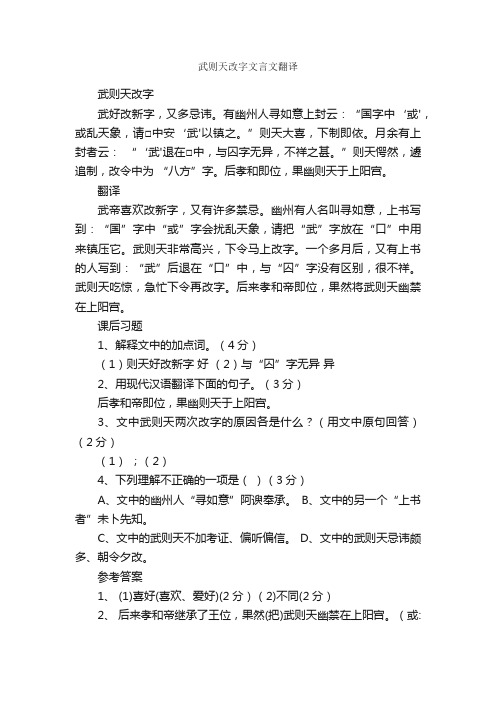
武则天改字文言文翻译武则天改字武好改新字,又多忌讳。
有幽州人寻如意上封云:“国字中‘或',或乱天象,请□中安‘武'以镇之。
”则天大喜,下制即依。
月余有上封者云:“‘武'退在□中,与囚字无异,不祥之甚。
”则天愕然,遽追制,改令中为“八方”字。
后孝和即位,果幽则天于上阳宫。
翻译武帝喜欢改新字,又有许多禁忌。
幽州有人名叫寻如意,上书写到:“国”字中“或”字会扰乱天象,请把“武”字放在“口”中用来镇压它。
武则天非常高兴,下令马上改字。
一个多月后,又有上书的人写到:“武”后退在“口”中,与“囚”字没有区别,很不祥。
武则天吃惊,急忙下令再改字。
后来孝和帝即位,果然将武则天幽禁在上阳宫。
课后习题1、解释文中的加点词。
(4分)(1)则天好改新字好(2)与“囚”字无异异2、用现代汉语翻译下面的句子。
(3分)后孝和帝即位,果幽则天于上阳宫。
3、文中武则天两次改字的原因各是什么?(用文中原句回答)(2分)(1);(2)4、下列理解不正确的一项是()(3分)A、文中的幽州人“寻如意”阿谀奉承。
B、文中的另一个“上书者”未卜先知。
C、文中的武则天不加考证、偏听偏信。
D、文中的武则天忌讳颇多、朝令夕改。
参考答案1、 (1)喜好(喜欢、爱好)(2分)(2)不同(2分)2、后来孝和帝继承了王位,果然(把)武则天幽禁在上阳宫。
(或:果然幽禁武则天在上阳宫)(3分)(即位、果、幽、于为关键词,注意句子通顺)3、(1) “國”字中“或”,“或”乱天象,请“口”中安“武”以镇之(1分)(2) “武”退在“口”中,与“囚”字无异,不祥之甚(1分)延伸阅读:文言文翻译的五字要诀文言文翻译应该掌握五字诀:留、删、增、调、变。
1、留即保留古今相同的词和专有名词,如人名、地名、朝代名、国名、官职、年号、某些典章制度名称以及物品名称等,这些不必翻译。
硬要翻译,反而会弄巧成拙。
2、删删去一些只起语法作用,没有实际意义的虚词;无法对应地用现代汉语进行翻译,删后又不影响句子的准确通顺的,亦可删去。
武则天简介-中英文对照

武则天简介-中英文对照武则天简介-中英文对照今天我要介绍的是中国历史上空前绝后的唯一一位女皇帝—武则天,她创造了中国历史的奇迹。
Today I want to introduce the only female emperor in China’shistory ---- Wu Zetian,who created the miracle of Chinese history。
她是中国历史上杰出的政治家、军事家,同时也是一位诗人。
She was an outstandingpolitician,strategist as well as a poet in Chinese history.武则天出生于唐朝大户人家,她拥有盖世的美丽,绝顶的聪明,并喜欢读书。
she was born in a wealthy family in Tang dynasty, She had thematchlessly beautiful and the very intelligent, and she also liked reading.童年时曾随父母游历了名山大川,培养了她的眼界和才干,所有的这些为以后称帝奠定了基础。
she had visited famous mountains and great rivers with her parents when she was a child, which had broadened her horizon and developed her talents, and all of these had laid the foundation for becoming the empress in the future.她14岁入宫,在经历了很多坎坷和磨难(例如感业寺出家)之后最终登上了皇位。
She was sent to the palace when she was fourteen, after many difficulties and hardships(such as become a nunin Ganye temple ),she became the empress in the finally. 公元690年,武则天改国号唐为周,正式做了皇帝。
武媚娘传奇文言文翻译
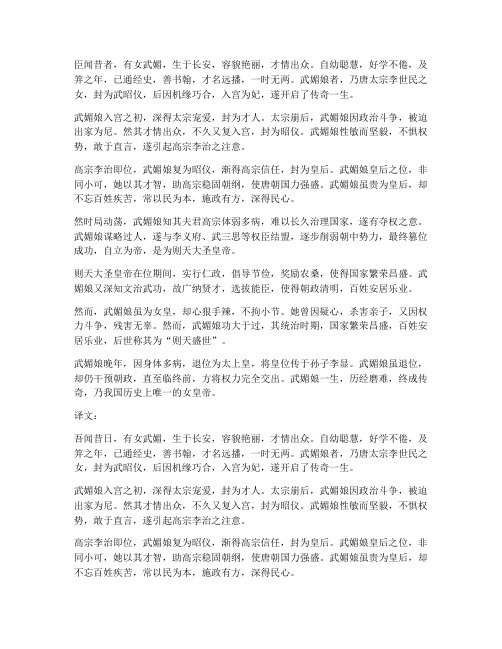
臣闻昔者,有女武媚,生于长安,容貌艳丽,才情出众。
自幼聪慧,好学不倦,及笄之年,已通经史,善书翰,才名远播,一时无两。
武媚娘者,乃唐太宗李世民之女,封为武昭仪,后因机缘巧合,入宫为妃,遂开启了传奇一生。
武媚娘入宫之初,深得太宗宠爱,封为才人。
太宗崩后,武媚娘因政治斗争,被迫出家为尼。
然其才情出众,不久又复入宫,封为昭仪。
武媚娘性敏而坚毅,不惧权势,敢于直言,遂引起高宗李治之注意。
高宗李治即位,武媚娘复为昭仪,渐得高宗信任,封为皇后。
武媚娘皇后之位,非同小可,她以其才智,助高宗稳固朝纲,使唐朝国力强盛。
武媚娘虽贵为皇后,却不忘百姓疾苦,常以民为本,施政有方,深得民心。
然时局动荡,武媚娘知其夫君高宗体弱多病,难以长久治理国家,遂有夺权之意。
武媚娘谋略过人,遂与李义府、武三思等权臣结盟,逐步削弱朝中势力,最终篡位成功,自立为帝,是为则天大圣皇帝。
则天大圣皇帝在位期间,实行仁政,倡导节俭,奖励农桑,使得国家繁荣昌盛。
武媚娘又深知文治武功,故广纳贤才,选拔能臣,使得朝政清明,百姓安居乐业。
然而,武媚娘虽为女皇,却心狠手辣,不拘小节。
她曾因疑心,杀害亲子,又因权力斗争,残害无辜。
然而,武媚娘功大于过,其统治时期,国家繁荣昌盛,百姓安居乐业,后世称其为“则天盛世”。
武媚娘晚年,因身体多病,退位为太上皇,将皇位传于孙子李显。
武媚娘虽退位,却仍干预朝政,直至临终前,方将权力完全交出。
武媚娘一生,历经磨难,终成传奇,乃我国历史上唯一的女皇帝。
译文:吾闻昔日,有女武媚,生于长安,容貌艳丽,才情出众。
自幼聪慧,好学不倦,及笄之年,已通经史,善书翰,才名远播,一时无两。
武媚娘者,乃唐太宗李世民之女,封为武昭仪,后因机缘巧合,入宫为妃,遂开启了传奇一生。
武媚娘入宫之初,深得太宗宠爱,封为才人。
太宗崩后,武媚娘因政治斗争,被迫出家为尼。
然其才情出众,不久又复入宫,封为昭仪。
武媚娘性敏而坚毅,不惧权势,敢于直言,遂引起高宗李治之注意。
- 1、下载文档前请自行甄别文档内容的完整性,平台不提供额外的编辑、内容补充、找答案等附加服务。
- 2、"仅部分预览"的文档,不可在线预览部分如存在完整性等问题,可反馈申请退款(可完整预览的文档不适用该条件!)。
- 3、如文档侵犯您的权益,请联系客服反馈,我们会尽快为您处理(人工客服工作时间:9:00-18:30)。
Empress Wu Zetian——the only female monarch of China
女皇武则天——中国唯一的女君主
She was born in a wealthy family in Tang dynasty, She had the matchlessly beautiful and the very intelligent, and she also liked reading. 武则天出生于唐朝大户人家,她拥有盖世的美丽,绝顶的聪明,并喜欢读书。
She had visited famous mountains and great rivers with her parents when she was a child, which had broadened her horizon and developed her talents.
.童年时曾随父母游历了名山大川,培养了她的眼界和才干。
She was sent to the palace when she was fourteen, after many difficulties and hardships(such as become a nun in Ganye temple ),she became the empress in the finally.
她14岁入宫,在经历了很多坎坷和磨难(例如感业寺出家)之后最终登上了皇位。
In 690, Wu Zetian changed the name of the dynasty Tang to Zhou, and became empress herself.
公元690年,武则天改国号唐为周,正式做了皇帝。
Wu took the whole situation into account and plan accordingly.
武则天具备一个皇帝的统筹全局观念。
Wu could judge the hour and size up the situation.
武则天能审时度势。
Wu could bring people‘s ability into play.
武则天是一位善于用人、唯才是举的领袖。
Wu had a unfathomable wisdom. 武则天拥有深不可测的智慧。
Wu had a psychological quality that not all people have.
武则天拥有常人不具备的心理素质。
Wu was a broad-minded emperor. 武则天心胸宽广。
When she ruled the country, she supported Buddhism.
She reused integrity and talented people (such as Di Renjie).
Economic and cultural developed rapidly, Frontier got stable and people all were in happiness.
在她执政期间,支持佛教,很多正直而有才能的人得到重用(例如狄仁杰),经济、文化繁荣发展,边疆得到稳固,人民生活幸福。
MAO Zedong said: she has Su Dongpo's generous, Li Bai's heroism, Li Qing-jao's talent, and Domineering of all the emperor.
毛泽东说:她,有着苏东坡的大气,有着李白的豪气,有着李清照的才气,有着历代帝王的霸气。
After she died, leaving a monument without any word, which aimed to evaluated Merits and Demerits by later generations
她去世之后,留下了无字碑,意在“功过由后人评定”
Although zhou was a generation,and there is only one empress in chinese history,only this one is enough to let us applaud loudly
周虽只传一代,女皇古往今来只有一个,可这一个,已经足够让我们直呼精彩了。
